Israeli Prime Minister Benjamin Netanyahu has said he "strongly opposes" ending the war in Gaza, ahead of his war cabinet meeting amid intense diplomacy to forge a truce and hostage release deal.
Mr Netanyahu has long rejected Hamas's demand in negotiations for a permanent end to the conflict prompted by the Palestinian militant group's 7 October attack and that has also left vast areas of Gaza in ruins.
A senior Israeli official, speaking on condition of anonymity, told AFP the war cabinet would "discuss a hostage release deal" today.
Before the meeting, Mr Netanyahu's office said Hamas chief in Gaza Yahya Sinwar "continues to demand the end of the war, the withdrawal of the IDF (army) from the Gaza Strip and leaving Hamas in place, so that it will be able to carry out the atrocities of 7 October again and again".
"Prime Minister Netanyahu strongly opposes this," a statement said.
A member of Hamas's political leadership, Izzat al-Rishq, accused Mr Netanyahu of "trying to buy more time to continue the aggression".
It comes as the Palestine Red Cross posted on X that Israeli aircraft killed or wounded a "large number" of people in a strike on a displacement camp near the southern city of Rafah.
"This location was designated by the Israeli occupation as a humanitarian area," it said.
The Hamas-run government media office in Gaza said late on Sunday that at least 30 people were killed and dozens wounded in the Israeli strikes.
"The Israeli occupation committed a horrific massacre by bombarding intensively and intentionally the UNRWA's Barkasat displacement centre northwest of Rafah Governorate," the office said in a statement, referring to the UN Palestinian refugee agency.
Gaza's civil defence agency said Israeli strikes had killed and wounded at least 50 people in the area, where it said 100,000 displaced people live.
Israel's military said on Sunday it had carried out a precise strike on a Hamas compound in the southern Gaza city of Rafah, but that it was reviewing the incident following reports that the strike caused a fire and civilians were harmed.
"An IDF aircraft struck a Hamas compound in Rafah in which significant Hamas terrorists were operating. The strike was carried out against legitimate targets under international law, using precise munitions and on the basis of precise intelligence that indicated Hamas' use of the area," the military said.
"The IDF is aware of reports indicating that as a result of the strike and fire that was ignited several civilians in the area were harmed. The incident is under review," it said.
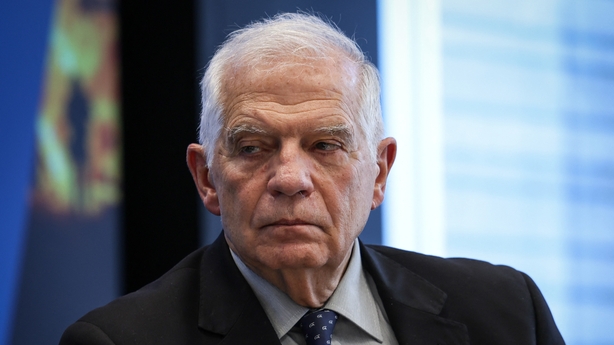
In Brussels, the European Union's foreign policy chief Josep Borrell told journalists before meeting Palestinian Prime Minister Mohammed Mustafa that a strong Palestinian Authority (PA) was in Israel's interest.
EU members Ireland, Spain and Norway, have said they will recognise the State of Palestine from Tuesday, drawing Israeli condemnation.
"A functional Palestinian Authority is in Israel's interest too, because in order to make peace, we need a strong Palestinian Authority, not a weaker one," Mr Borrell said.
Mr Mustafa, whose government is based in the occupied West Bank, said the "first priority" was to support the people in Gaza, especially through a ceasefire, and then "rebuilding the institutions of the Palestinian Authority" in the territory after Hamas seized it from the PA in 2007.
US President Joe Biden has pushed for renewed international efforts to halt the war, now in its eighth month.
The Israeli official had said yesterday that "there is an intention to renew these talks this week" after negotiations involving US, Qatari and Egyptian mediators stalled in early May.
However, Mr Rishq said that so far, "we have not received anything from the mediators".
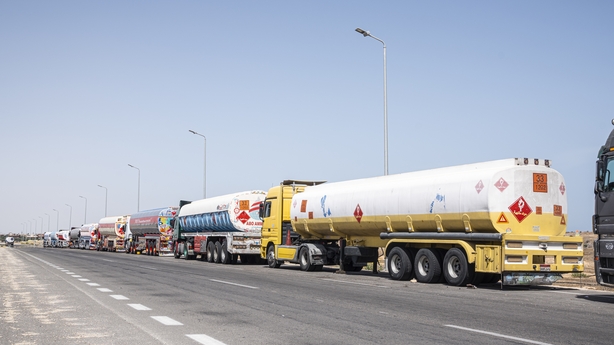
It comes as Israel said it is prepared to allow around 200 aid trucks into Gaza through Kerem Shalom at the southeastern edge of the Palestinian enclave, bypassing the main Rafah crossing that has been blocked for weeks.
The aid shipments follow an agreement between US President Joe Biden and Egyptian President Abdel Fattah al-Sisi yesterday to temporarily send aid via the crossing.
Khaled Zayed, an official from the Egyptian Red Crescent, told Reuters 200 trucks of aid, including four fuel trucks, were expected to enter today through the Kerem Shalom crossing.
Egypt's state-affiliated Al Qahera News TV shared a video on social media platform X, showing what it said were aid trucks as they entered Kerem Shalom, which before the current conflict was the main commercial crossing station between Israel, Egypt and Gaza.
Israel is under growing pressure to get more aid into Gaza after more than seven months of a war that has caused widespread destruction and hunger in the enclave.
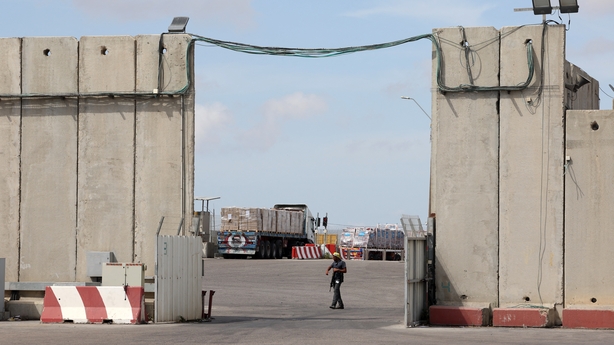
The Rafah crossing, which during the war has been the main entry point into Gaza for humanitarian aid and commercial supplies, has been shut for almost three weeks, since Israel took control of the Palestinian side of the crossing as it stepped up its military offensive in the area on 6 May.
Egypt has been increasingly alarmed at the prospect of large numbers of Palestinian refugees entering its territory from Gaza and has refused to open its side of the Rafah crossing.
Israel has said it is not restricting aid flows and has opened up new crossing points in the north as well as cooperating with the United States, which built a temporary floating pier off the central coast of Gaza to help speed up distribution of supplies.
Eight projectiles fired at Tel Aviv
Hamas has said it launched missiles at Tel Aviv, prompting sirens to sound in the Israeli city for the first time in four months as the Palestinian group sought to show military strength despite Israel's Gaza offensive.
The Israeli military said eight projectiles were identified crossing from the area of Rafah, the southern tip of Gaza where Israel kept up operations despite a ruling by the top UN court ordering it to stop attacking the city.
The Israeli military said a number of the projectiles were intercepted.
Israeli emergency services said they had received no reports of casualties.
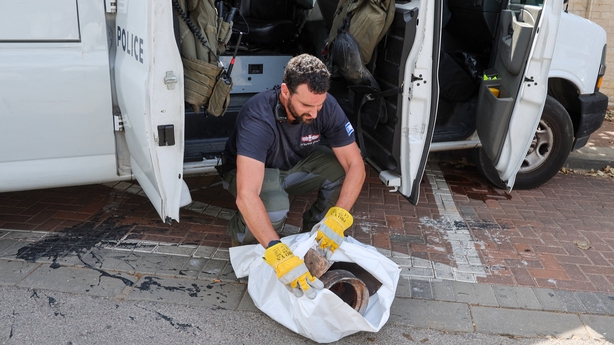
In a statement on its Telegram channel, the Hamas al-Qassam Brigades said the rockets were launched in response to "Zionist massacres against civilians".
Hamas-affiliated Al-Aqsa TV said the rockets were launched from Gaza.
Rafah is located about 100 km south of Tel Aviv.
Israel says it wants to root out Hamas fighters hiding in Rafah and rescue hostages it says are being held in the area, but its assault has worsened the situation for civilians and caused an international outcry.
Following the rocket salvo, Israel's hardline public security minister Itamar Ben-Gvir - who is not part of Israel's war cabinet - urged the army to hit Rafah harder.
"Rafah with full force," he posted on X.
Israel has meanwhile kept up operations in Rafah despite an order on Friday by the top United Nations court, the International Court of Justice, to stop attacking the city.
Israeli strikes killed at least five Palestinians in Rafah today, according to local medical services.
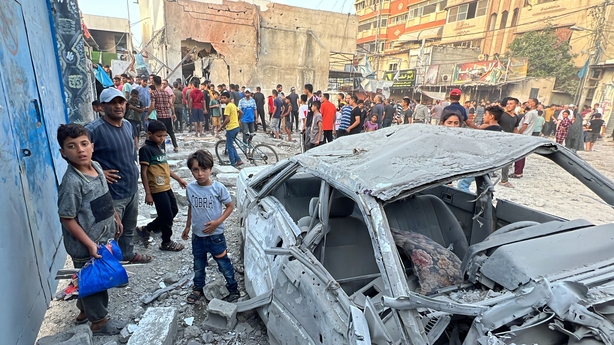
Israeli tanks have probed around the edges of the city, close to the main southern crossing point into Egypt, but have not yet entered the city in force.
Israel said it wants to root out Hamas fighters hiding in Rafah and rescue hostages it said are being held in the area, but its assault has worsened the situation for civilians and caused an international outcry.
Nearly 36,000 Palestinians have been killed in Israel's offensive, Gaza's health ministry says.
Israel launched the operation after Hamas-led militants attacked southern Israeli communities on 7 October, killing around 1,200 people and seizing more than 250 hostages, according to Israeli tallies.
Ceasefire prospects
Fighting has also continued in the northern Gaza area of Jabaliya, a heavily built up area which saw weeks of intense combat earlier in the war and where Israel says it has sought to prevent Hamas from re-establishing its presence.
The military denied statements by Hamas that its fighters had abducted an Israeli soldier.
The armed wing of Hamas has earlier claimed it had taken "prisoner" at least one Israeli soldier in an ambush in Gaza.
"Our fighters lured a Zionist force into an ambush inside a tunnel ... The fighters withdrew after they left all members of the force dead, wounded, and captured," Abu Ubaida, the spokesman for Al Qassam Brigades, said in a recorded message broadcast by Al Jazeera.
However, in statement the military said: "The IDF (Israeli Defence Forces) clarifies that there is no incident in which a soldier was abducted."
Hamas released a video that appeared to show an injured person being dragged along the ground in a tunnel and photos of military fatigue and rifle.
Reuters could not independently verify the identity of the person shown in the video nor his or her condition.
It comes as efforts to agree a halt to the fighting and return more than 100 hostages still held in Gaza have been blocked for weeks but there were signs of some movement at the weekend following meetings between Israeli and US intelligence officials, and the prime minister of Qatar.
An official with knowledge of the matter said a decision had been taken to resume the talks this week based on new proposals from Egyptian and Qatari mediators, and with "active US involvement."
However there has been no confirmation from Hamas and an official from the movement played down the report, telling Reuters: "It is not true."
Izzat El-Reshiq, a senior Hamas official in exile, said the movement had not received anything from the mediators on new dates for the resumption of talks as had been reported by Israeli media.
Mr El-Reshiq reiterated Hamas's demands, which include: "Ending the aggression completely and permanently, in all of Gaza Strip, not only Rafah.
"This is what our people are waiting for, this is the core issue and the starting point for anything."
While Israel is seeking the return of hostages, Prime Minister Benjamin Netanyahu has repeatedly said the war will not end until Hamas is eliminated.
